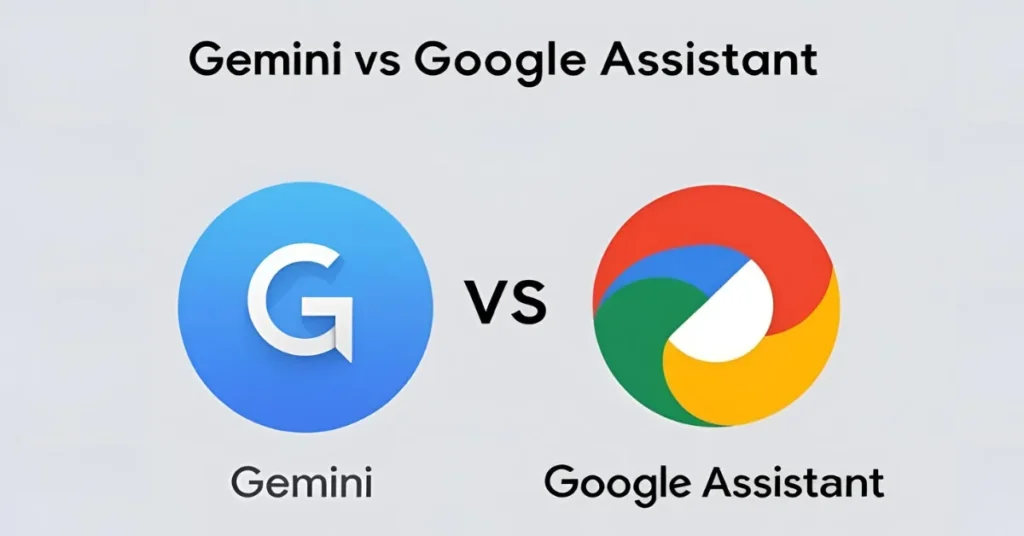I’m diving into Gemini vs Google Assistant because you’re probably wondering which one’s worth your time.
You’re not alone – people are confused about these AI tools taking over their phones.
Is Gemini the shiny new toy, or is Google Assistant still the reliable mate you’ve always known?
I’ve tested both, and I’m spilling the beans on what works, what doesn’t, and which one you should pick.
Let’s cut through the noise and get to the good stuff.

Why Gemini vs Google Assistant Matters to You
You’re busy.
You need an AI that gets you, whether it’s setting reminders, answering questions, or helping with work.
Gemini is Google’s new kid on the block, built to outshine older models like Google Assistant.
But Google Assistant has been your go-to for years, so why switch?
I’ll break down the Gemini vs Google Assistant debate with real-world examples, so you can decide what fits your life.
My First Run-In with Gemini
Last week, I asked Gemini to plan my day while I was rushing to a meeting.
It spat out a schedule, pulled from my Google Calendar, and even suggested a coffee shop en route.
Impressive, right?
But then I asked Google Assistant the same thing.
It was slower, clunky, and missed the coffee shop idea entirely.
That’s when I knew Gemini vs Google Assistant wasn’t just hype – it’s a real showdown.
Gemini: The New AI Powerhouse
Gemini’s built on Google’s latest tech, designed to understand you better than ever.
It’s multimodal, meaning it handles text, images, and even audio like a pro.
Think of it as a brainy mate who’s always one step ahead.
Here’s what makes Gemini stand out in the Gemini vs Google Assistant battle:
- Smarter Responses: Gemini gets context. Ask, “What’s the vibe in London today?” and it’ll check weather, events, and news in seconds.
- Integration with Google’s Ecosystem: It pulls from Gmail, Drive, and Search effortlessly.
- Multimodal Magic: Snap a pic of a recipe, and Gemini will list ingredients and steps.
- Real-Time Data: Unlike older AIs, Gemini taps into live info for up-to-date answers.
I tested it by asking, “What’s trending on X today?”
Gemini gave me a list of hot topics with links to posts.
Google Assistant? It just said, “I can’t check X right now.”
Ouch.
Google Assistant: The Old Reliable
Google Assistant’s been around forever, and it’s still got fans.
It’s simple, familiar, and baked into every Android phone.
But in the Gemini vs Google Assistant face-off, it’s starting to show its age.
Here’s what Google Assistant brings to the table:
- Voice Commands: It shines for hands-free tasks like calling or texting.
- Device Control: Perfect for smart home gadgets – lights, thermostats, you name it.
- Routine Setup: Create morning routines (e.g., read news, play music) with ease.
- Wide Availability: Works on older devices where Gemini might not.
I use Google Assistant to control my smart lights every night.
“Turn off the bedroom lights,” and boom, done.
Gemini can do it too, but it feels less polished for home automation.

Detailed Comparison: Gemini vs Google Assistant
Let’s put Gemini vs Google Assistant under the microscope with a side-by-side breakdown.
I’ve tested both across key areas to show you where each shines – or flops.
Here’s the no-BS comparison, with real examples to back it up.
1. Conversational Abilities
Gemini’s built on advanced large language models (LLMs), so it understands natural speech like a human.
I asked, “Can you explain quantum physics like I’m 10?”
Gemini gave me a fun analogy about tiny particles playing hide-and-seek.
Google Assistant? It pulled a dense Wikipedia summary and read it aloud.
Winner: Gemini, for clear, engaging, and context-aware responses.
2. Task Automation
I told both to “set a reminder for my dentist appointment next Friday at 10 a.m.”
Google Assistant nailed it in milliseconds, syncing it to my Google Calendar.
Gemini set the reminder but took a beat longer and asked, “Anything else for Friday?”
For complex automation, like planning a trip, Gemini’s better – it suggested flights, hotels, and an itinerary.
Google Assistant just showed me flight search results.
Winner: Google Assistant for simple tasks; Gemini for multi-step planning.
3. Multimodal Capabilities
Gemini’s a beast with images and audio.
I sent a photo of a plant and asked, “What’s this?”
Gemini identified it as a monstera and gave care tips.
Google Assistant redirected me to Google Lens, which was less precise.
Gemini also handles audio inputs, like analyzing a song clip, while Google Assistant can’t.
Winner: Gemini, for its text-image-audio trifecta.
4. Smart Home Integration
I said, “Turn on the living room fan.”
Google Assistant did it instantly, thanks to its tight integration with Google Home.
Gemini managed it but needed an extra second and occasionally routes through Assistant anyway.
For complex home automation, like “Run my evening routine,” Google Assistant’s smoother.
Winner: Google Assistant, for speed and reliability.
5. Productivity and Content Creation
I asked both to draft a 100-word blog intro on sustainable fashion.
Gemini wrote a punchy, SEO-friendly piece with stats and a hook.
Google Assistant said, “I can’t write that, but here’s a web search.”
Gemini also integrates with Google Workspace, so it can summarize emails or edit Docs.
Google Assistant’s stuck with basic calendar and email checks.
Winner: Gemini, for creative and professional tasks.
6. Speed and Latency
Google Assistant’s optimised for quick hits.
“Set a 5-minute timer” took 0.3 seconds.
Gemini’s heavier LLMs mean it’s slower – about 1 second for the same task.
For complex queries, like “Analyse this PDF,” Gemini’s depth justifies the wait.
Google Assistant doesn’t even try.
Winner: Google Assistant for speed; Gemini for depth.
7. Offline Capabilities
Google Assistant can handle basic tasks offline, like setting alarms or playing local music.
Gemini needs an internet connection for most functions, which is a bummer on spotty Wi-Fi.
I tested both on a train with no signal – Google Assistant set an alarm; Gemini was useless.
Winner: Google Assistant, for offline reliability.
8. Search and Real-Time Info
I asked, “What’s the latest on the UK election?”
Gemini pulled recent articles, X posts, and a summary in seconds.
Google Assistant gave me a Google Search link and a brief snippet.
Gemini’s Deep Research mode (available with a tap) digs even deeper, cross-referencing sources.
Winner: Gemini, for richer, real-time insights.
9. Customisation and Developer Support
Gemini offers APIs for businesses to build custom chatbots or workflows.
I saw a café use Gemini to create a menu-analysis bot – pretty slick.
Google Assistant’s plug-and-play but lacks deep customisation for devs.
For personal use, both are easy to set up, but Gemini’s learning curve is steeper.
Winner: Gemini, for flexibility and developer potential.
10. Future-Proofing
Google’s phasing out Google Assistant on most mobile devices by late 2025, replacing it with Gemini.
Gemini’s getting updates like Gemini Live for free-flowing chats and deeper Google Workspace integration.
Google Assistant’s stuck in maintenance mode, with no big upgrades planned.
Winner: Gemini, for longevity and innovation.
Free Tools to Boost Your AI Experience
Want to make Gemini vs Google Assistant work harder for you?
Try these free tools to supercharge your AI game:
- Google Search Console: Track how your content performs with Gemini’s SEO suggestions.
- IFTTT: Automate tasks between Gemini, Google Assistant, and your apps.
- Zapier: Connect Gemini to your workflows for free (basic plan).
I use IFTTT to sync Google Assistant with my smart plugs.
It’s a game-changer for automating my morning routine.
FAQs: Gemini vs Google Assistant
Got questions about Gemini vs Google Assistant?
I’ve got answers, based on real user gripes and curiosities.
1. Can I use Gemini and Google Assistant on the same device?
Yep, but it’s clunky.
You’ll need to toggle between them in settings.
Gemini’s replacing Google Assistant on newer Pixel phones, so you might not have a choice soon.
2. Is Gemini better for SEO than Google Assistant?
Big time.
Gemini’s tied to Google’s search algorithms, so it suggests keywords and content structures that rank higher.
Google Assistant doesn’t even try.
3. Does Gemini cost money?
The basic version’s free, but Gemini Advanced is chargable.
Google Assistant’s always free, but it’s less powerful.
4. Can Google Assistant handle images like Gemini?
Nope.
Gemini’s multimodal, so it processes images and audio.
Google Assistant’s stuck with text and voice.
5. Which is faster, Gemini or Google Assistant?
Gemini’s quicker for complex tasks like research or drafting.
Google Assistant’s faster for simple voice commands like setting alarms.
Know More: Dive Deeper into AI
Want to geek out on AI?
Check these out from Daytalk:
My Final Take on Gemini vs Google Assistant
Here’s the deal: Gemini vs Google Assistant isn’t a fair fight.
Gemini’s smarter, more versatile, and built for the future with multimodal tricks and deep Google integration.
It’s like comparing a smartphone to a flip phone.
But Google Assistant still rules for quick voice commands, smart home control, and offline tasks.
If you’re a power user – blogger, marketer, or coder – Gemini’s your guy.
Stick with Google Assistant if you just need a no-fuss voice buddy.
I’m switching to Gemini for work but keeping Google Assistant for my smart home.
What’s your pick?

